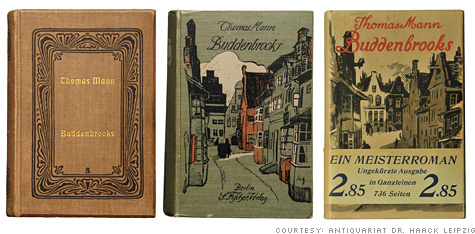Search News

(Fortune Small Business) -- America's publishers churn out new business books by the boatload, but none of them has as much to say about running a family business as a single novel published in Germany 108 years ago.
Thomas Mann's Buddenbrooks is the kind of work that modern marketers would label "a sprawling multigenerational saga." But in Mann's case, it's not hyperbole. Buddenbrooks chronicles, with profound insight, the four-decade rise and fall of a fictional 19th-century family of grain merchants in the Baltic seaport of Lübeck.
Buddenbrooks isn't the only literary work that shines a light on the vicissitudes of entrepreneurial life. Philip Roth's American Pastoral does for the postwar glove business what Moby Dick did for whaling. The Financier and The Titan, both by Theodore Dreiser, are subtle accounts of a businessman's adventures in a land of opportunity. V.S. Naipaul's A Bend in the River is the best description I've read of life as a vulnerable member of an entrepreneurial minority group. All these books are great reading for any business owner.
What makes Buddenbrooks particularly interesting is its author's deep understanding of how hard it is to keep a family enterprise going generation after generation. Mann (who won the Nobel Prize for Literature in 1929, mainly for this book) had firsthand knowledge of his subject: He grew up in Lübeck, in just such a family. The book spans four generations of Buddenbrooks, along with a host of sharply drawn relations, and the family members deal with the same kind of problems that bedevil family businesses in 21st-century America.
Succession Planning: The Buddenbrook clan and its fate demonstrate the inadequacy of heredity as a technique for sustaining a family enterprise, for each new scion proves less adept at business than the previous one. (The final generation, embodied by young Hanno Buddenbrook, isn't fit for much of anything except spending long, enraptured hours at the piano.) It's as if the drive and enterprise that launched the business are diluted every time a chief executive reproduces.
Marriage: Then there's the problem of matrimony. Like many wealthy scions, the Buddenbrook offspring are beset by gold diggers. Poor Tony Buddenbrook is pressured by her family (bent on sustaining the business via the altar) into marrying a seemingly pious entrepreneur who proves to be a con man. Her second marriage is little better. Her hapless brother Christian marries a woman of ill repute who quickly has him committed to a mental institution, and Tony's daughter gets hitched to a future felon.
The most compelling -- and tragic -- figure is Thomas Buddenbrook, who runs the business through much of the book. Thomas is a decent businessman, for the most part, but it's a role he's adopted and one for which he never seems fully suited. He ages prematurely under the strain of maintaining that role -- and keeping family members from dissipating assets, making bad marriages or dishonoring the Buddenbrook name.
Focus: Thomas squanders his own energies in public affairs, getting elected senator only to find himself enmeshed in endless meetings and hindered by his growing vanity. His life becomes increasingly about keeping up appearances rather than expanding the family enterprise. The lesson is clear: If you're going to run a business, focus on that business, because it's not going to run itself.
Perhaps most striking is the extent to which the business exercises a kind of tyranny over the lives of family members. Tony sacrifices her happiness. But even Thomas, who comes to embody the firm and the name it carries, finds himself held hostage to it, perhaps even more so than the family members who merely depend on its earnings.
Buddenbrooks is a cautionary tale, easy to read despite its bulk. It powerfully illustrates the joys and pitfalls of running a family business -- and the reasons why most family firms don't last beyond a single generation.
Read it and you may wonder whether it would be better if yours didn't either. ![]()






| Index | Last | Change | % Change |
|---|---|---|---|
| Dow | 32,627.97 | -234.33 | -0.71% |
| Nasdaq | 13,215.24 | 99.07 | 0.76% |
| S&P 500 | 3,913.10 | -2.36 | -0.06% |
| Treasuries | 1.73 | 0.00 | 0.12% |
| Company | Price | Change | % Change |
|---|---|---|---|
| Ford Motor Co | 8.29 | 0.05 | 0.61% |
| Advanced Micro Devic... | 54.59 | 0.70 | 1.30% |
| Cisco Systems Inc | 47.49 | -2.44 | -4.89% |
| General Electric Co | 13.00 | -0.16 | -1.22% |
| Kraft Heinz Co | 27.84 | -2.20 | -7.32% |
|
Bankrupt toy retailer tells bankruptcy court it is looking at possibly reviving the Toys 'R' Us and Babies 'R' Us brands. More |
Land O'Lakes CEO Beth Ford charts her career path, from her first job to becoming the first openly gay CEO at a Fortune 500 company in an interview with CNN's Boss Files. More |
Honda and General Motors are creating a new generation of fully autonomous vehicles. More |
In 1998, Ntsiki Biyela won a scholarship to study wine making. Now she's about to launch her own brand. More |
Whether you hedge inflation or look for a return that outpaces inflation, here's how to prepare. More |